Being bitten by a tiny 8 week old puppy is surprisingly painful. It is also very upsetting. After all, we generally don’t bite our friends! Puppies start teething at 3-4 months old. Puppies do bite because they are teething, but they also bite in play. And biting tends to start in earnest once the puppy has settled into their new home, at around 9 weeks old.
Contents
- My puppy bites a lot!
- Why do puppies bite kids?
- Is my puppy aggressive?
- When do puppies stop biting?
- How to train a puppy not to bite
Is it normal for puppies to bite a lot?
Yes it is! Almost all puppies bite and some bite much harder than others. It’s also normal for puppies to growl ferociously when they are biting. It’s all part of the game and does not mean your puppy is bad tempered.
How long do puppies teeth and bite?
With some exceptions, puppy biting will stop by the time your puppy has his full set of grown up teeth at 7 months. Fortunately, you can stop your puppy from biting long before they have cut all their adult teeth.
Do puppies grow out of biting?
If you do nothing at all, to teach a puppy not to bite, the biting would likely subside over the next few months. But its very easy to do the wrong thing, and actually encourage a puppy to bite more. And in those cases, play biting can become very rough and the relationship between a young dog and their family can break down.
So it’s important you read the information below.
Labradors can be particularly bitey as puppies and you’ll find information specific to Labs as well as information on stopping puppies of all breeds from biting and hurting you.
I’m going to give you some great tips now, to get you through the puppy biting phase, and out the other side without tears! We’ll be looking at some of the triggers that make puppy biting so much worse, at how to keep the biting phase short, and at how you can help small children and puppies get along. You’ll also find a helpful video below.
Do All Labradors Bite?
Anyone who shares their home with a 10 or 12 week old puppy will tell you that Labradors bite! And I can reassure you that this applies to all Labradors in the first few months of life. Fortunately this is a phase puppies go through and not a permanent character flaw. And most adult Labradors are indeed very good natured dogs.
Before I set about showing you how to transform your Labrador puppy from crocodile to cuddly friend again, we’ll have a little look at what makes your puppy so bitey. And also at what is normal, and what is not.
My Puppy Bites A Lot
Worried new puppy parents will often say “but I don’t think this is normal puppy biting, he is biting such a lot, and mainly biting the children.” And it certainly is worrying when the your children’s tears after playing with the puppy, are not the tears of joy you had anticipated.
When your new puppy is in full ‘biting mode’ and pursuing your terrified three year old around the kitchen, you can be forgiven for wondering if you have made a terrible mistake in bringing him into your lives at all. Let’s take a closer look
My Puppy Is Biting My Children!
If your children are in tears at being bitten every time they try to play with and cuddle their new friend, you may be wondering if your puppy is becoming aggressive.
You may even worry that your children might be at risk. Fortunately I can reassure you that this is not the case. While your puppy may frighten your children with his sharp teeth and growling. The way he is behaving now does not mean he will be a threat to their safety in the future.
Happily, studies have shown that behavior in small puppies is not predictive of the way that they will behave as adults!
Why Do Puppies Bite Children?
Some breeders will not sell puppies to homes where there are small children. This is because puppies often bite children and teenagers harder and more persistently than they bite grown-ups. It is normal for small puppies to make small children cry, but before you rush your puppy off to the local shelter, bear with me a moment, because I can help with that.
Children give off conflicting signals to the puppy. And because puppies are poor at interpreting children’s movements and vocalisations they respond inappropriately. Fortunately there are lots of ways to make it easier on yourself and on your kids. We’ll have a look at those in a moment.
In short, you need to be a little patient at this point, and it helps to know that this phase does pass quite quickly. And that it is completely normal for all puppies to bite a lot, and to bite children with particular enthusiasm!
Why Do Labrador Puppies Bite So Much?
It has to be said, Labradors are even more bitey than some other breeds of dog during this stage in their development. In fact, retrievers generally tend to be very bitey as puppies.
We have bred these dogs for generations to be a little obsessed about putting things in their mouths, so maybe it isn’t so surprising that they are very mouthy when they are still small and very playful. The constant biting can still come as a shock though, to anyone who thought that they had adopted a ‘gentle’ breed. As can the pain of being bitten.
“These are not ‘nips’!” say many new puppy parents “they are real ‘bites’!”
My Puppy Bites So Hard!
“Wait a minute ” you cry “I am actually being injured by my puppy, surely that isn’t normal?” The answer I’m afraid is, yes, it is. Puppy bites do hurt. And sometimes they leave marks.
Pain, bruising, scratching, little tooth marks on your toddler, these are all part and parcel of raising a puppy. Some very enthusiastic puppies will even draw blood on occasions. All this is normal, but I will explain what you can do about it.
“Alright” you say “so the biting is normal, and the pain is normal, but the noise, the snarling, – that’s not normal – right?”
Is My Puppy Aggressive?
Perhaps the most serious concern that new puppy parents have, is the fear that their puppy is becoming aggressive. We may have lived alongside dogs for thousands of year, but that doesn’t alter the fact that these are powerful predators with jaws capable of doing great harm.
It is only natural for an inexperienced puppy owner to worry that their puppy’s behavior might be a sign of a dangerous animal in their midst
The thing most likely to make people think their puppy is aggressive isn’t the constant biting, or how hard their puppy bites, or even how much it hurt. What really worries people is the snarling.
My Puppy Is Growling At Me!
When puppies play, they practice being fierce. They throw themselves into the whole play acting thing with huge enthusiasm. And they are brilliant at it.
Your puppy’s aim is to make himself sound hugely fierce and scary. It’s all part of the game. And the most important part of that game is to make as much noise as possible and to sound as angry as possible.
So, all puppies growl or snarl ferociously when they play, while they are biting, and sometimes when they are trying to entice their poor owners into yet another game. Your pup won’t just sound fierce, he’ll look fierce too. His little face will be all scrunched up, his lips drawn back, his teeth showing. It’s not surprising your kids have gone right off him!
Your puppy’s mother, and his brothers and sisters all understood this was a game and weren’t bothered by it. So he has no idea that he is frightening your children or that you are wondering if he is turning into a horrible aggressive and dangerous beast.
Please do be reassured, that however fierce your ten week old puppy sounds. It is just a game. He is truly just playing.
Normal Puppy Play Behavior
So, the hard truth is, all puppies bite. And many puppy bites are quite painful. Some Labrador puppies bite more than most, and biting a lot, and growling or snarling at the same time is normal.
So is biting so hard that it makes your eyes water, and even occasionally breaks the skin. Puppies bite at hands that go to stroke them, at bare feet, and happily tug away at clothing, all the while trying to sound as fierce as they possibly can. All this is normal.
And you, quite naturally, will want to know exactly when it is going to stop!
When Do Puppies Stop Biting?
Even if you do nothing, if you don’t play physically with your puppy very much, the biting will naturally begin to decrease at around four to five months of age. This tends to happen without much active ‘no-bite’ training in families where there are just one or two adults, who are experienced with puppies and don’t get puppies excited.
It also happens in working dog families where the dogs may be kennelled or at least are not allowed unsupervised interaction with anyone apart from their trainer or main carer. A study carried out on Guide Dog puppies in 2001 showed that simply rejecting interaction and refusing to play was enough to stop the puppies biting their adult puppy walkers.
But, and it is a big but – in most young families, this is not always what happens. In many families, especially where the puppy is a novelty, everyone plays with the puppy, and often in quite a physical way. This gets puppies very excited and tends to make biting worse. Inexperienced puppy owners also tend to inadvertently prolong the biting phase by rewarding the puppy with attention when he bites.
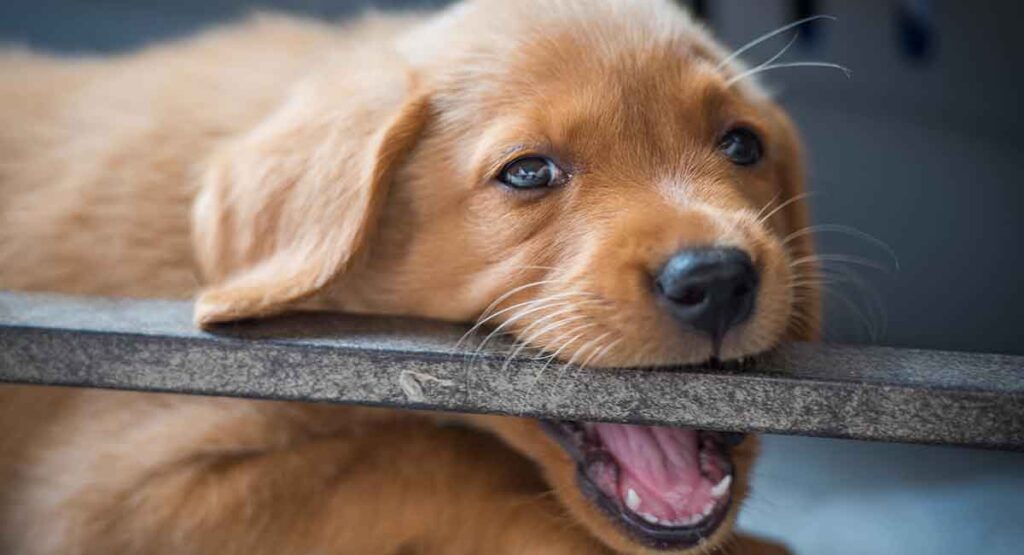
Things That Make Biting Worse
To summarise, these are the three things that make biting worse in most Labrador puppies
- Excitement
- Attention
- Poor bite inhibition
Let’s take each of these in turn:
Puppies bite more if they are excited. The more excited they get, the harder they bite. Rough physical play gets puppies excited, rubbing puppies tummies, chasing puppies, grabbing at puppies. All these things get puppies bubbling with excitement
Noisy behavior can get puppies excited too, so children squealing, or crying, grown ups shouting or getting cross. All these things can send little puppies into a kind of ‘meltdown’
Rewarding puppies with attention
Rewarding puppies for biting also makes puppies bite more, and prolongs the biting phase. You might not think you are rewarding your puppy for biting, but you probably are. And you are probably rewarding him with ‘attention’
Puppies love attention. Labrador puppies are particularly social and love attention more than most puppies do. Any kind of contact with you, or other members of the family, including physical contact, talking, shouting, even eye contact, all reward your puppy.
And if you give him these things while he is biting, this will reinforce the biting behavior and he will bite more in the future
Poor bite inhibition
What makes the bites hurt more, is poor bite inhibition. So the next section explains what bite inhibition is and how you can help your puppy improve his.
What Is Bite Inhibition?
At just eight or nine weeks old, Labrador puppies are actually capable of crushing bones the thickness of your little finger, with their jaws.
But your puppy doesn’t break your fingers when he bites you! He probably doesn’t even break the skin. This is down to a process called ‘bite inhibition’.
Your puppy has been learning to inhibit his bite since he was tiny. It’s the equivalent of ‘pulling his punches’. His mother and brothers and sisters all helped to teach him how hard he can bite without hurting them.
Fur versus skin
Unfortunately, you don’t have a nice fur coat, so the level of force your puppy could use on his mother, is too painful for delicate human skin. But he doesn’t know that yet.
This is where your training will come in. You’ll be teaching him how much force is acceptable. So, why don’t we just teach him not to bite at all from the get go?
Well, you can do this, but a number of experts think that staged bite inhibition training is very important in order to make sure that your puppy has complete control over the amount of force he applies at any time in the future.
- You can read more about bite inhibition and bite inhibition training in this article
What About Puppy Teething?
We mentioned teething earlier because people tend to associate biting with teething. So, is it true that puppies bite so much because they are teething? And how long will teething go on for? In fact, most problem puppy biting is simply play.
Puppies may chew or mouth at fingers to help relieve the discomfort of teething, but this is not the major cause of the biting problems we find in homes with small puppies. And it certainly isn’t the cause of the snarling and tugging that accompanies play biting. That’s just puppies having fun.
Most puppies have their adult teeth by the time they are 7 months old, but biting does not usually last that long.
- You can read all about puppy teeth and teething on this page
Biting At 9 Weeks Or 10 Weeks
At this stage your puppy’s bite is not quite as powerful as it will be in a week or two, but those teeth are still needle sharp.
Don’t be lulled into a false sense of security because your puppy is so small. He is growing fast and by 11 or 12 weeks those bites will hurt a lot more. The time to begin taking action is now!
How To Train A Puppy Not To Bite
So, now we have looked at why Labrador puppies bite, and some of the things that make biting worse, let’s look at how to make things better. We’ll do this in stages
- Separate and supervise
- Stop making things worse
- Teach your puppy not to hurt you
- Train your puppy not to bite
- Safe play for Labradors
#Stage One: Separate and Supervise
The first step in this process is to protect any children you may have, or that visit and play with your puppy
You may well have had a lovely picture in your mind of your sweet puppy and children playing happily together whilst you relax with a glass of wine, or mow the lawn. But for the time being, you need to put this image aside.
Children under five are simply not capable of playing with a puppy under four months without getting bitten. So you need to supervise every interaction between them.
Puppies and Children – Do’s and Don’ts
- Don’t let children take your puppy into their bedroom.
- Do put baby gates across doorways, even if you no longer need them for your children. Baby gates allow you to separate children and puppies when you are not free to supervise.
- Do show children how to stroke the puppy gently whilst you hold one end of a rawhide chew and let the puppy gnaw on the other end.
- Do make sure that children don’t get the puppy excited or run around squealing whilst he chases them. It will end in tears.
Playful Visitors
It is not just children that play inappropriately with puppies. I have known grown men grapple roughly with a tiny puppy, rolling him around the floor, making growling noises, whilst the puppy gnaws on his knuckles.
It may seem like a bit of fun to him, with his work-roughened hands, but there won’t be a happy ending when the puppy tries this game on your toddler.
Again, supervision or separation is the key, and if your visitor won’t be calm around your puppy, pop the little one in his crate until your boisterous guest has departed.
Saving your sanity and enjoying your puppy
If you were not expecting this, it can seem like a big deal, but supervision and some separation is essential if you are to keep your sanity, and your children are to dry their tears and carry on enjoying their puppy.
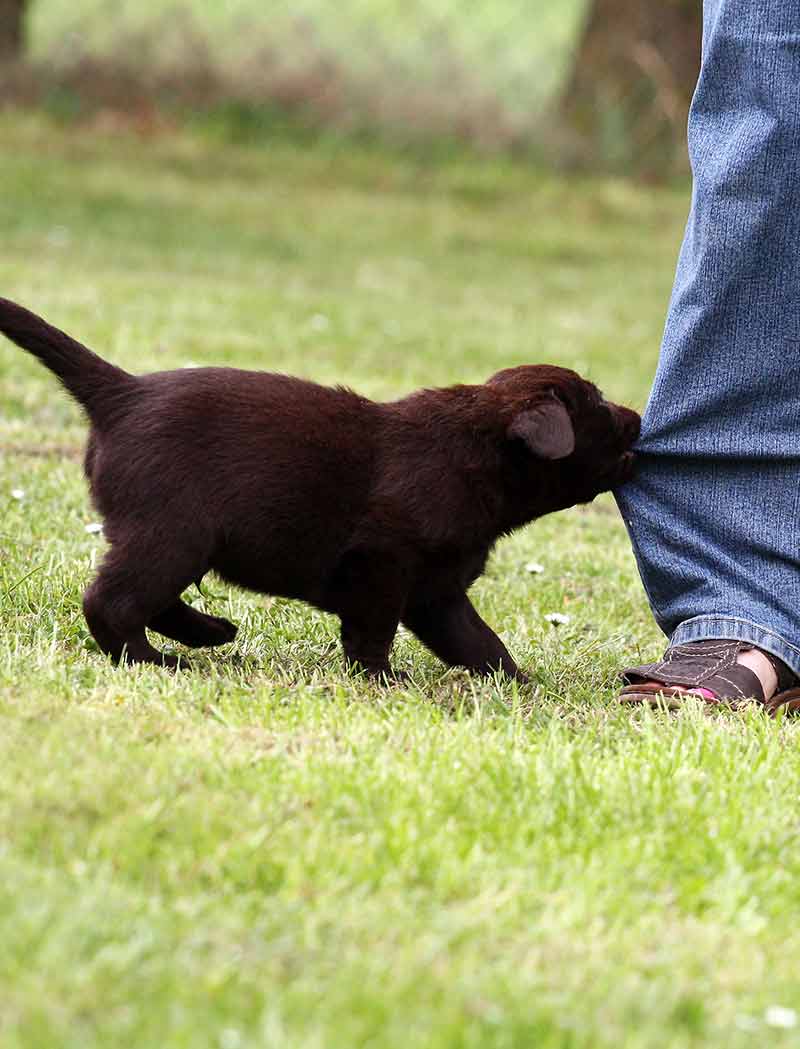
With older children, you need to teach them how to interact with the puppy without getting him overwrought. Labrador puppies, like toddlers, are easily over-excited. And when they are over-excited they start to be silly.
Don’t worry, things will improve very quickly as the puppy learns to control his biting. The next stage is all about making sure you avoid doing all those things we talked about which make biting worse
#Stage Two: Don’t Make Things Worse
Remember how we talked about excitement and attention? Your first job at this stage, is to keep your puppy calm. To recognise when he is getting over-excited and ‘break up’ the game.
Your second job is to stop giving your puppy rewards for biting. Remember, a Labrador puppy’s favourite reward is your attention.
Make sure the puppy gets no reward at all when he bites someone. Especially no attention. The next stage explains how you can do that.
#Stage Three: Teach Your Puppy Not To Hurt You
This is the ‘bite inhibition’ training we talked about above. The process whereby the puppy learns to use his mouth gently on your skin – and it takes a little while.
Bite inhibition is taught in stages.
The puppy learns to reduce the power of his bites gradually. And is eventually taught not to ‘mouth’ human skin at all.
Most experts believe it’s worth spending time on this. We’ll being by teaching the puppy not to hurt us with his teeth.
What to do when your puppy bites
If your puppy bites and hurts you, remove your attention immediately. This is where baby gates can be really helpful.
If you are playing with your puppy and he bites you, you can step over the gate, thus effectively removing all attention from him. All of a sudden his playmate has disappeared.
What about squealing
You may have heard that a puppy will stop biting if you yelp or squeal. And you can try this, because it does work with some puppies. But many puppies get even more excited by the yelping, and on others it has no effect.
The strongest signal you can give your puppy is the loss of your presence and attention.
What about punishment?
Some people try and stop puppies biting by smacking them or shouting at them. There are several problems with this.
- Firstly, it tends to only stop the puppy biting the person who did the yelling. So it won’t necessarily stop your puppy biting your children.
- Secondly, punishment builds an association between an unpleasant event, and your presence, this can give you problems with teaching things like ‘recall’ later on.
And in any case, you don’t want your puppy to be scared of you, that just isn’t a great way to begin your friendship.
Most importantly, punishment through physical or verbal reprimands is now proven to be associated with aggression later in a dog’s life. Which is of course the very opposite of what you are trying to achieve!
That’s why modern behaviorists and veterinary professionals all now recommend that puppies are taught using positive training methods and not force.
You can find out more about the potential impact of punishing your Labrador here.
What if you need to move a biting puppy?
If you need to move the puppy away rather than stepping away from the puppy you may find he bites at your hands when you go to pick him up or take hold of his collar. Here’s what to do if that happens:
How To Stop Your Puppy Biting Hands
Some puppies bite when they are picked up. Others bite when they are stroked or petted.
We are fond of wiggling our fingers at puppies, petting them and rubbing our fingers in their fur, not behaviors that dogs really understand. And many puppies see fingers and toes as something to chase and play with.
Hands are a particular target for puppy bites so teach your children to interact with your puppy using toys that he can tug and bite on, rather than playing with him using their bare hands.
Instead of using your hand as a toy, or rubbing your puppy’s tummy, use a long strong rope tug toy to play with him.
Distracting your puppy
If you want to sit and pet your puppy, or your children do, use treats or hold a rawhide chew with one hand so he can gnaw on the end. Once he is calmly involved in eating or chewing, you’ll be able to pet him without being nipped
Using a houseline
If your puppy regularly nips at your hands when you go to pick him up when he is getting overexcited, you need a better way of removing him from what he is doing.
Have your puppy wear a harness and houseline so that you can pick up the end of the line and move him to where you want him to go without his grabbing at your hands.
#Stage Four: Train Your Puppy Not To Bite
This is where we teach the puppy to let us stroke and pet him, or handle him in any way we like, without him putting his mouth around our fingers.
The best way to do this is with a clicker and some dog treats. But you can also use a word like YES instead of the click.
Here’s how the training exercise goes:
- You move your hand a little way towards the puppy
- If he doesn’t move his mouth towards your hand say YES! And place a treat on the floor in front of him
- Now move your hand a little bit closer to the puppy
- If he doesn’t move his mouth towards your hand say YES! And place a treat on the floor in front of him
You see where I am going with this? Don’t stuff your hand right in the puppy’s face to begin with, set him up to win. Build up slowly so that you can touch him anywhere on his head or body, pick up his paws etc. All without him grabbing or mouthing at you.
What do I do if he mouths at me?
If the puppy grabs at your hand, you got too close. Make smaller hand movements further away from him until he ignores those, then bring the movements gradually closer.
#Stage Five: Playing Safely
As puppies grow older biting can reappear. Puppies between six and nine months of age, are extremely boisterous, and may start nipping with their teeth during play. At this age, your puppy is more than half grown, and his size and weight are a significant problem if rough play is allowed.
The secret to avoiding and resolving this issue is to change the way you interact with your puppy. And to ensure that children follow your example.
Boisterous and excitable puppies must not be allowed to play rough games with small people. The consequences can be very unpleasant, and it is no coincidence that this is the age at which many young dogs are abandoned or given up to rescue.
Safe Puppy Play
The secret to avoiding these kinds of problems is ‘safe play’. And you can read all about how to play safely with a large dog in this article: Dogs and Kids: Playing safely with your Labrador
If you find yourself struggling to resolve boisterous biting in a young dog, it’s well worth while spending an hour or two with a professional behaviorist.
They’ll be able to see where you are going wrong and give you practical tips to calm your dog and stop the biting once and for all. Here are a few more articles that you might find helpful:
When Do Puppies Stop Biting?
Biting is a frustrating and sometimes painful stage of puppy development, but however fierce your puppy may sound, and however hard he bites, it really is just playful and normal puppy behavior. And most puppies grow out of it by two years old, and have reduced their biting significantly by a year old.
If this is your first puppy a good puppy pre-school class using modern force free training methods, will support you through this stage and is a great way to help you avoid other puppy behavior problems too.
Use the five steps above to help your puppy pass through this phase as quickly and comfortably as you can. And don’t forget to join the forum to get support from other puppy parents!
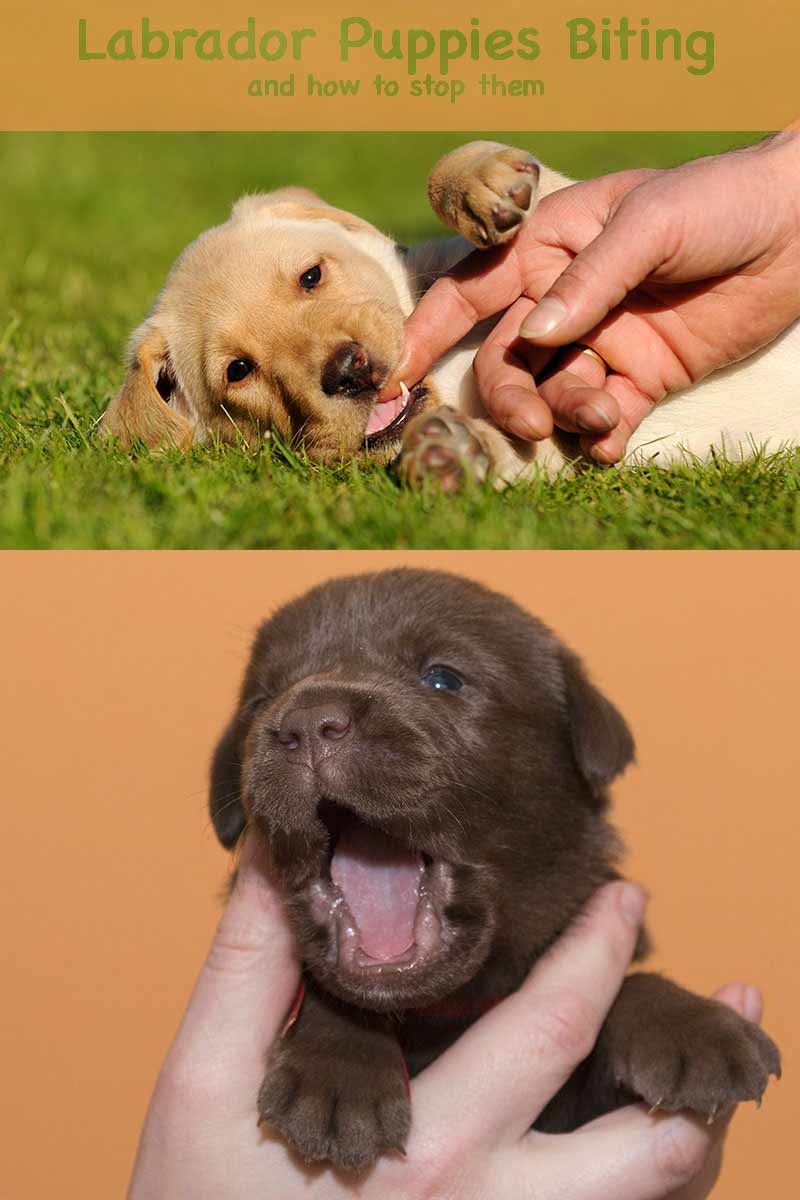
The Labrador Site Founder
Pippa Mattinson is the best selling author of The Happy Puppy Handbook, the Labrador Handbook, Choosing The Perfect Puppy, and Total Recall.
She is also the founder of the Gundog Trust and the Dogsnet Online Training Program
Pippa's online training courses were launched in 2019 and you can find the latest course dates on the Dogsnet website

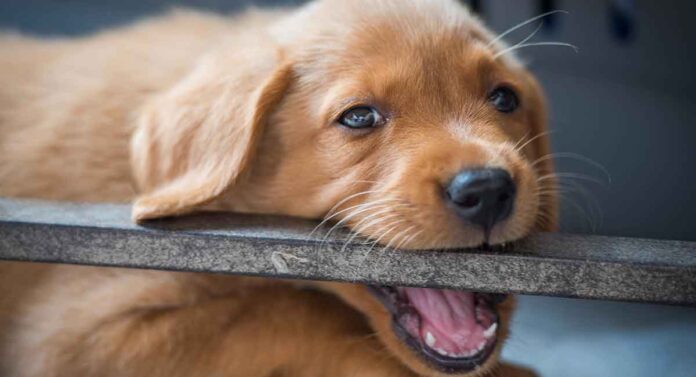



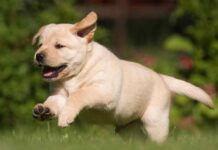
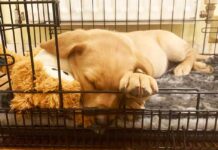

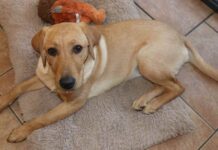










My daughter has a Papllion, a puppy when she got her, she is very close to my daughter.The problem is the dog will not sit in the car in her doggy seat she screams out she would rather sit on my daughters lap when driving which is very unsafe.What can she do so the dog can sit in her car seat, even her dog bed she just won’ t sit.Thank you
Having issues with our lab Bella. She is 6.5 months old . She is crate trained and settles well in the crate. When she is outside the crate, she will not settle at all unless she has food.. she will bite furniture, bite us, run up and door but will never settle even if she has had a long walk and puppy play date.
Any ideas on how to settle her pls? I have tried giving her treats when she lies but its so rare I cant really reinforce her . Worried we are giving her too much treats like pizzles etc but its only time she will settle at all .. Will really appreciate any advise! She also wont stop table surfacing and grabbing items too!
My 20 week old Lab has never been much of a mouthy puppy but the past 3 weeks she has been relentless. Is this normal to get worse? She went for my sons face this morning he (my son)was asleep on the sofa and it came out of nowhere. I can’t help but worry it’s more then play biting
adopted a lab retriever girl,2 yrs old from the pound. took her to vet and groomer. she is all white with brown markings. problem. she is in my dining room,gates up on both entries,she has destroyed beautiful things,including chewing through lamp cords,portable fan cords,while plugged in,chair legs,reached up on table,broke centerpiece,hates my male sheltie who also was adopted from pound,5 yrs old,great dog. Lacey has all her shots. we exercised her in my large yard few times a day. she pulls on leash,take leash off and runs fenced yard like a crazy dog.ready to return her to the pound. my daughter who is 50 is exhausted with her,i am in my eighties and little afraid of her. what to do. i am at the end of my rope with her. she is friendly and loveable,then before you know it,she chases her tail and starts chewing furniture. i did not sign up for this. pleas help me. i cannot afford a trainer on my fixed income. be blessed. thanks.
Great compilation of resources & information. Well done!
Thank you, best read I have done after I got a puppy (american bully). I have read most easy available out there, and this is far the best I found so far.
Thank you
Interesting the labrador puppies are so “aggressive” and bite-y… I had no idea. I’ve mostly only ever interacted with adult labs and they’re always so friendly. It’s kind of cute in a way that they act so tough when they’re puppies but grow up into the most friendly dogs ever.
OMG I did quite de opposite. I grew so frustrated with my puppy last night I yelled at her for biting so hard, I believe she is now afraid of me 🙁 she won’t bite me or anybody else and literally stops whatever she’s doing (wrong) when I say no, regardless of the tone or volume I use 🙁 How do I fix it?
hi ,was wondering why you did not mention anything about Dudley yellow lab is it a real Labrador or not?
also,i have papers on it,he is a pig headed pup 6 month old,with no black pigments all light red or pink,also his noes and is the pretty light yellow with a little darker yellow color on sides and mane….someone told me he is a rare yellow lab…he is a pig headed,pup,but loving,wondered your opinion on that type.also i heard there not,liked by the kennel club and can’t be shown ..he is the slender American type.
Dudley Labradors are a variant of the standard yellow Labrador, you can find out more about them here: https://www.thelabradorsite.com/dudley-lab/
Great info thanks
Great article! So we aren’t supposed to play w 10 wk pups at all? Just keep them calm?
We have a 15 week old yellow lab
We got her when she was 8 weeks old.
Our problem is that she doesn’t sleep during the night at all and during the day she she takes 20 minutes naps only. What can we do to help her sleep at night? Thanks
Exercise him more during the day, if possible. Instead of regular walks take longer walks, much longer walks… 30 min- 1 hr. Or one really long walk. Ya gotta start somewhere. Try and find patterns in his sleeping. If after meals.. Take him out instead of letting him rest. If its crappy out play with him instead of walking. Try to look up ideas on stimulating him mentally and physically. Pretty much dont let him nap when he wants. Just like a child. Anything to get him to fit in to your schedule.
we recently got a chocolate lab and he is 10 weeks old! he was doing great until he started barking. he barks and barks and wakes people in our house up. he will also bark when we are not paying attention too him. he will keep barking till we look at him. is there a way we can train him not to bark
Hi Kathy, There is! Check out this article: https://www.thelabradorsite.com/labrador-barking/
Hello, we recently got a Fox red lab from a friend who had no time for him. He is 4 months old and we are pretty much starting from scratch with him when it comes to discipline. Do we do all the stages at once or do we master the first stage and then go on from there?
Great Article. But people should realize that they are getting a dog, not an obedience machine. Expectations bring frustration. Dogs are Dogs.
puppies squeak or even shriek when other puppies bite them too hard-it’s how young dogs learn to interact with each other. we have had great luck teaching our dogs to have a soft mouth simply by imitating that squeak when our puppies bite us….followed by the withdrawal of attention for a few minutes. seems to solve the problem within a few days to a week or two.
Hi Pippa, My “baby Lab” is now 15 months old. We are in beginning agility. When he goes through a series of obstacles and I have a big party with him, in his excitement he STILL bites me. For a while he went through a phase of pinching me. I think I have nipped that in the bud. Not sure how to handle the excitement in agility class though 🙁
I live in an Apartment complex, if I remove attention from my puppy after he becomes over-excited, I’m afraid he will disturb everyone within a mile radius. I understand he will stop barking eventually, but I don’t know how to not disturb my neighbors by letting him carry on.
hi we are getting a yellow 8 week old male labrador retriever puppy and i think your advice will be helpful
I have a 9 month old Chocolate (English) Lab. She is very mouthy when she wants to play. She loves to mouth my hand, not biting so much but she cant stop the desire to bite the hands when playing indoors.
She is pretty smart and is trained but this habit needs to stop. Any advance would be wonderful! Thank you in advance Pippa!
Hi Laurel, you can use this link to join the forum for help and support with your dog
I have a 12 week old lab that likes to bite and nibble my husband and me all the time. We feel like his chew toy. Now he started this past weekend with my ankles. I love this little fellow but if he keeps it up my husband i dont no what hes going to do. The dog bites pretty hard. I try to shove chew toys in his mouth but that only works a few minutes. Please tell me what to do.
hi just should very very very loud or rule him loud orbit him or her
I have a 5 month old Chocolate Lab who won’t stop biting us. He is about 45 Lbs. now and it is of growing concern. Our arms look like pin cushions. I hope that this stops soon because I really love this dog. He is a great dog except for the biting. I’m hoping he grows out of this. Your thoughts , please.
Really excellent article! I’ve been working on this with 9 week old golden retriever without making much progress, so it’s good to know that biting is normal at this age and can’t be fixed overnight. I’ll keep working at it!
Good luck Jessica, you’ll soon be through it. And do join the forum if you need some support . Goldens are very welcome 🙂
We have an 11 week old male lab
Something is happening now that is very upsetting
When we take him outside he wants to eat anything he finds on the ground which we understand is normal behaviour but when we won’t let him eat garbage or other potentially harmful things he becomes very angry and bites at us and at his leash and refuses to walk and just keeps lunging and biting at
our legs and being very, very aggressive to the point where it is difficult to get him back inside without being badly bitten!
This is definately not play biting and it only happens when he is not allowed to eat what he wants. I have never seen a puppy become so extremely aggressive like this. Can someone help us with this?
I have a 12 week lab and I am having this sand issue. The aggression is very bad when I try to stop her from digging or bitting on my couch. She lungs at me and my son. It definitely is not playing around. The hair on her back is is very visible. I was just wondering if your pup out grew this or what did you do to help. Thanks
I think what you’re describing is a “puppy tantrum”. Yep, I read that puppies have tantrums too! If you invest in a mouth harness that may be a good tool to control the pup when he lunges. Once he has a boundary set and understands the consequences, he may stop quickly. Good luck!
Hi Pippa. I have a 14 week yellow lab and unfortunately she is a little terror. we can’t sit down without her trying to jump up and bite. She constantly tries to bite anything that moves. It is difficult to practice the strategies suggested for biting. Only 3 or 4 times in the past month has she been quiet enough to lie down by us and sleep, and that’s usually before we go to bed. It is becoming a stressful situation and we are not sure of the best way forward.
Pippa, thank you for all the tips. I have a one specific problem and hope you can provide a useful suggestion. I have a four-month golden lab, who is a gentle and smart dog most of the time. Except when he gets excited and starts jumping and nipping! I will try your tips on bite inhibition and jumping discouragement, but the problem is that this behavior starts without a discernible cause like rough-play or inappropriate handling. My elderly mother lives with me, so I cannot always walk out of the room, and he is generally so riled up during one of these episodes that it is difficult to apply separation, which is what i have been doing so far. But without knowing the trigger, there is only this much I can do. This behavior is directed only towards me, which is most worrisome. Sometimes it is just me walking into the room, and there he goes. What sort associations do you think he has formed to act this way. and how can I change my handling of him so as to eliminate possible triggers? Any words of advice from your experience will be appreciated.
Pippa, thank you so much for your informative article. I am buying your book. Our sweet baxter is indeed a fury crocodile. I am a therapist and had hoped to use him in my practice, not yet! I am going to use several tips, gate to separate (don’t like the idea of putting him in his crate always), house line when he is over excited, use the staging of bit inhibition.
What do you think about bitter sweet on my hands, I guess I am thinking about using it to buy time until he has further developed. Also, when we have visitors, do you suggest for a time period that we put him to rest in his crate. Have a squealy teenager who visits and just can’t seem to understand the importance of being calm….